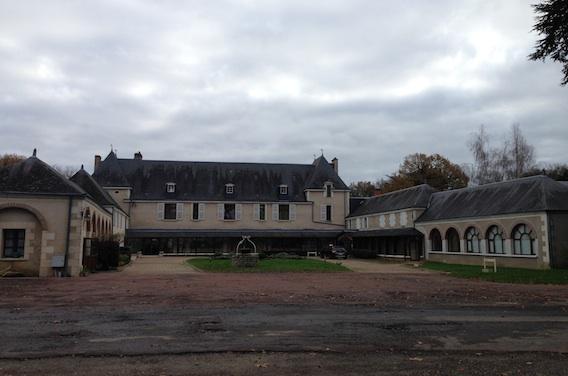
REPORT – The police were on the front line during the 2015 attacks. An establishment, unique in France, welcomes those who find themselves in psychological suffering.
A year ago, France lived for a few days in terror and amazement. The January 2015 attacks claimed 16 victims, including three members of the security forces. In addition to the trauma caused by these terrorist attacks, police and gendarmes have since been in great demand to protect the population, as part of the Vigipirate plan.
Conditions that weighed heavily on their mental health: post-traumatic stress syndromes have been diagnosed in some, and a worrying increase in addictions to psychotropic drugs has been observed.
It is a few hundred kilometers from Paris, in a green setting near Tours, that some of these patients, not quite like the others, are taken care of. For over 60 years, the center of Courbat, created by the National Association of Social Action of the staff of the national police and the Ministry of the Interior, welcomes members of the security forces confronted with burn-out, addictions, or depression.
 Le Courbat establishment, near Tours. Credit: Léa Surugue
Le Courbat establishment, near Tours. Credit: Léa Surugue
A philosophy specific to the center
Entering this small haven of peace, in the middle of a forest, the visitor discovers a large manor house, which stands on the edge of a pond. In the cool of the morning, a group of men and women gather little by little at the entrance of the main building, an old stone building, for the morning call.
The vast majority of them are police officers and gendarmes, of all ranks, who came to Courbat for a period of one to two months. They are here to begin a real physical and psychological recovery. Those who suffer from addictions first went through withdrawal, in one of Courbat’s partner establishments.
Attacks: How traumatized police officers rebuild themselves. Report in the center of Courbat, near Tours bit.ly/1VTd6uB
Posted by Why actor on Saturday 9 January 2016
The center can boast of original support, based on the reappropriation of the body. Beyond the medical and psychological interviews, after all classic, physical and artistic activities are offered. The idea is to develop autonomy and self-esteem, by pushing patients to surpass themselves during these workshops, as explained by Frédérique Yonnet, director of Courbat.
Frederique Yonnet : “The main basis of support is re-athleticism. The basis of the care is the recovery of self-esteem, it is knowing how to look at yourself differently, at least not in a deleterious way as patients do when they arrive … “
New patients also sign a personalized care contract, with concrete objectives. They must, from the start, prepare a life plan for their discharge, with the help of caregivers.
For this, they can count on a very special person, who makes Courbat a special place of care. This is Billy, the medico-social assistant policeman. He himself comes from the profession, and is the link between health personnel and patients.
“ Automatically, trust sets in because they tell each other, Billy was a police officer, he knows what we’re going through. Sometimes, they trust me with confidences that they do not tell anyone else and my role is to listen to them, and to push them to reestablish a dialogue with psychologists, of whom they are sometimes wary ”says he cheerfully.
Civilians and police together
Last originality: as Le Courbat receives support from the Regional Health Center Agency, it also admits civilians from the region. A mixture that allows a rapprochement that seemed unthinkable before.
Kevin, a young patient from Courbat, went through difficult times, and lived on the streets. At the time, he was wary of the police, who sometimes dislodged him from places where he settled down to sleep. At Courbat, confidence in the police is gradually being reinstalled.
“The barriers are breaking down, there is no longer any question of hierarchy in our relations. My vision changed a little, I saw that they were not morons, on the contrary. They are human and sometimes disgusted with their job because what they are made to do is difficult ”explains the young man.
Bad press
While its care is nationally recognized, the center does not have good press in the police community. The Courbat patients, like Stéphane, say that their call for help may have been seen as a sign of weakness. “We hesitate to say that we are going to Courbat, because after the hierarchy hesitates to entrust you with certain missions,” he laments.
Stéphane, policeman and patient: “It’s the refuge for alcoholics from the police, that’s a bit the image it had. Colleagues who come here are said to be on a sailing course. With us, as soon as we show the slightest weakness, we hesitate to entrust you with certain missions … “
The culture of the group is strong in the police, and the weakened individual can be seen as a threat to the collective. “However, I assure you that it takes real courage, real strength of character to come here and recognize that we have a problem,” says Ivan, a police officer in Brest.
Indeed, some do not dare to ask for help, with sometimes disastrous consequences. The number of suicides is thus increasing in the ranks of the police. Especially since beyond the post-attack climate, the working atmosphere has already been deteriorating for several years, due to a policy of deleterious figures.
In 2014, the suicide rate of the general population was 18 per 100,000, while in the national police, it reached 38 per 100,000. A national plan was put in place last year to stem the problem. (see box)
At Courbat, we are very vigilant about this problem, and all staff are trained to identify the risk of suicide, including maintenance and canteen staff. The center is also working closely with the health services of the Ministry of the Interior on the subject.
After Courbat: challenges and successes
Even after a passage in Courbat, healing is not guaranteed and remains a long-term process. Several patients are on their second or even third stay in the establishment. In addition, the bad image conveyed by the center in the police force complicates professional reintegration.
However, patients regain a certain serenity at the end of their stay, which they did not have when they arrived. Le Courbat does not abandon them when they leave, it encourages them to continue with psychological follow-up.
Olivier, police officer : “Since my first visit I have relapsed without falling into strong alcohol. For the second passage I will leave not brand new but more or less on feet. It gave me back desires that I didn’t have before … “
Recently, Frédérique Yonnet invited police students to visit Courbat. She wants to change mentalities in the police about the center, by focusing on those who will be in charge tomorrow. In this time of tension, where many police officers may have been traumatized, it is all the more important that they have the courage to ask for help without fear of being left out. Frédérique Yonnet expects a further increase in admission requests at the start of the year, following the attacks of November 13.
Frederique Yonnet, director of Courbat: “I have an authorization for 56 dedicated beds, we went up to 70 in the summer because we had a lag time after the attacks. In January, we expect the same thing after the attacks of November 13, and I am in contact with the ministry to say that we are clear-headed and ready … “
The ministry’s suicide plan
Also a year ago, in January 2015, the Ministry of the Interior, led by its minister Bernard Cazeneuve, unveiled a new plan to fight suicide in the police. In 2014, the police forces saw an upsurge in the number of suicides in their ranks, with 55 deaths, against an average of forty in previous years.
Several measures have been taken to combat this scourge. In particular, the ministry has increased the staff of the operational psychological support service, a service which brings together clinical psychologists located throughout France. With 13 new recruits in 2015, the SSPO is now made up of 73 professionals, to whom suffering police officers can be referred.
A volunteer agent is also appointed in each service, as a “staff support referent”. Specifically trained, he directs his colleagues to the right contacts when needed.
Another key measure is to try to reorganize work cycles to improve the work-life balance, because long hours often weigh down on police officers.
The suicide plan also tackles a basic problem, the permanent access of the police to their service weapon.
“The police are considered a high-risk profession, in particular because they have access to lethal means,” underlines Catherine Pinson, who heads the SSPO. You have a number of acting out that happens on impulse. Maybe with limited access to the weapon the scenario would have been different, it’s someone we could have helped ”
A device was tested in the Val d’Oise, with personal lockers in which the police could leave their weapons at the end of the day. For the moment, no assessment has been made of the initiative, but the idea was to reduce mortality by removing officers from their weapons.
A whole prevention approach must also be undertaken in the police services.
“The key is to work very early on on primary prevention, to improve the link between professional and private life, they must be prepared to self-assess their symptoms. The police officer, especially if he encounters a difficulty, must have privileged access as early as possible to the occupational doctor who will take over from the outside if necessary. It is essential that there is total trust between this doctor and the one who consults, explains Florence Foullon, head of the department of preventive medicine at the ministry.
The independence of the preventive doctor is essential and his role and missions must be clearly identified. There are structures that are being set up, Le Courbat for example is making a lot of efforts to set up appropriate consultations ”.
.















